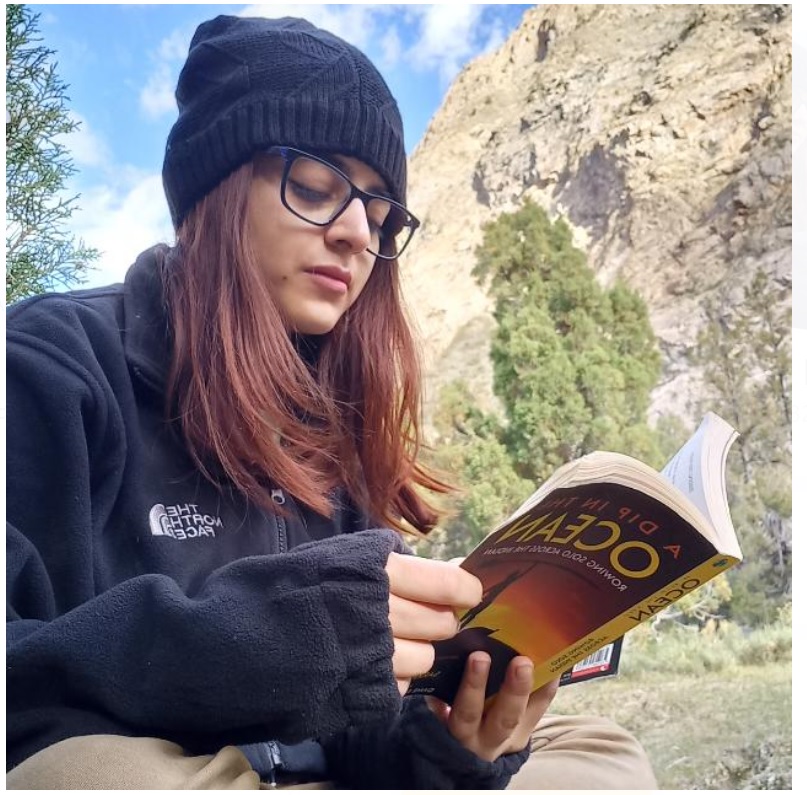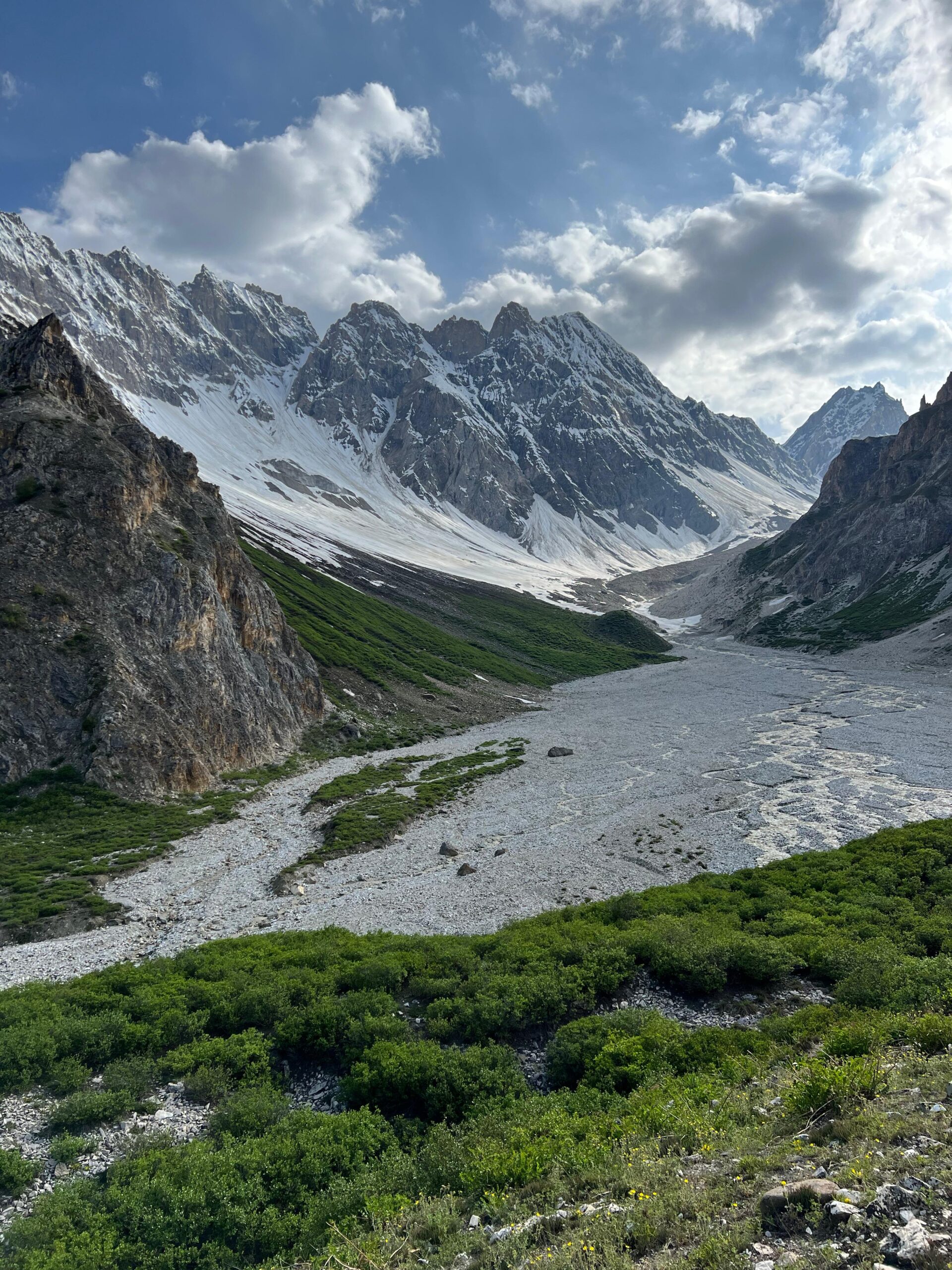By Sana Haroon
In the heart of the Karakoram Range, surrounded by towering mountains and rugged terrains, I found more than just a trekking experience – I found the soul of Gilgit Baltistan, manifested by its people and their great amiability.
As I write this from the comfort of my home, my mind drifts back to the unforgettable days I spent in the stunning Karakoram Mountains. It took me a few days to gather thoughts, but here it is – an expression of reflection on my journey that was shaped by experience.
“In every walk with nature, one receives far more than he seeks”——-John Muir
As I laced up my boots and took my first step toward K1 (Masherbrum), memories of my childhood dreams of adventure flooded back. It was a dream come true for the 16-year-old in me who had always yearned to explore valleys, sleep under the open sky, and embrace the freedom of being close to nature. It was a long-held desire, lived out a hundred times in my imagination, that finally became a reality.
Little did I know, this trek would offer me far more than breathtaking landscapes; it would reveal a hidden side of myself and also introduce me to the extraordinary warmth of the people of Baltistan.
A little recap: people often say there’s a first time for everything, and that first time is always scary. I was a bit scared too. Even though I had mentally prepared for this opportunity for years, I started feeling nervous once it was finalized. I was joining a group of strangers, which I had never done before, and I began to doubt my ability to cope with the trek.
My biggest fear was the thought of wanting to turn back—it would have felt like a failure, especially since I had always fantasized about this adventure. It felt like it could shatter years of expectations and desires.
My second fear was the uncertainty of the unknown: what if something bad happened? It could have undermined both my spirit and my sense of accomplishment.

A big shout-out to the adventure agency I chose Guide to Adventure, which proved to be reliable and eased my doubts and worries. While I won’t go into the details here, you can read more about their exceptional services and support in the article below.
Related Story: Finding Solitude in the Majestic Mountains: My Trek to Masherbrum Base Camp
One of the key lessons I learned from this very moment was that instead of stepping back because of fear, one should confront it and be mentally prepared for any challenges that come your way.
Their children have a deep understanding of and love for tourism ingrained in them. Seeing this, I truly believe there is a bright future for tourism in Pakistan, filled with promise and potential
The trek was planned for the last week of June. On June 27th, I boarded an Air Blue A320 flight from Islamabad, the capital of Pakistan, at 9 AM. In just one hour, we landed at one of the most stunning airports—Skardu Airport—having covered a road distance of 637 kilometers. Isn’t it impressive?
The service on Air Blue was commendable, so I would definitely recommend it to anyone planning a flight to Skardu.
With my heart filled with excitement, I was warmly received by one of our guides. The people there were incredibly welcoming as if they lived to offer their service, warmth, and hospitality to everyone who stepped onto their land.

To begin our trek to K1, we had to stay overnight at a beautiful hotel named Refugio Hushe in the last village of Hushe Valley, which was about a 4.5-hour drive (158 km) from Skardu via the Shyok River Valley Road. We left for Hushe on the same day. Our trip organizer, Waris Balti, made sure we had everything we needed before leaving the city, so we made several stops to pick up food and camping supplies. It’s also worth noting that Waris runs ‘Siachen Farm Ghanche,’ a project under Siachen Foods and Guide to Adventure, which offers organic fruits and vegetables and supports agri-tourism in Pakistan. We also stopped at Siachen Farmhouse to collect some of these supplies before heading on our main journey.


The experience of being with them—traveling, interacting, and feeling at ease so quickly—was fulfilling. Along the way, we were greeted by little girls and boys who waved at us, and their adorable gestures were unforgettable. When we reached the village, people welcomed us with kindness and warmth. It was exceptional to witness the deep sense of respect among the people of Baltistan. They greet every single person they cross paths with “Salam”, reflecting their genuine respect for each other.

Their children have a deep understanding of and love for tourism ingrained in them. Seeing this, I truly believe there is a bright future for tourism in Pakistan, filled with promise and potential.
This made me think about how detached we have become in our societies, especially in big metropolitan cities. We live in our own bubbles and view outsides as separate, whereas here, in the land of Gilgit Baltistan, they make you feel like one of their own.
I have always respected all communities, but the kindness of these people is something I want to share with the world to promote their amazing spirit and love for tourism.
The next day, we started our trek from Hushe Hotel, lifted our backpacks, tied up our boots, and set off for our first campsite, Parbisan. Once I hit the trail, with each step, I found myself getting used to the new surroundings. I found myself adjusting to the people, the simple living conditions, and the physical demands of the trek. It took us about three hours to reach, leaving us plenty of time to enjoy the site. Nearby, we saw stone huts where local women lived and cared for their livestock.
Meeting these women was a highlight of the journey. Fortunately, I had the opportunity to meet and talk with some of the local women and girls. Their welcoming nature was deeply moving. One of those women, very lively and friendly, made us a cup of mountain tea and served us fresh, organic yogurt. Most of them spoke Urdu, while a few knew only Balti.
During our conversations, I was amazed to learn that some of the local sheep herders were pursuing careers in fields like medicine, and their impressive literacy rates spoke volumes about their community’s commitment to education. It’s worth mentioning that recently, Pakistan’s top high-altitude mountaineer, Naila Kiani, has been appointed as a national goodwill ambassador for girls’ education. Her passion for education is impressive, and I hope she makes a big impact.
Spending time with them made me realize how minimal facilities can bring happiness, while we have made our lives and lifestyles very difficult to maintain. It made me reconsider my own choices and think about where I can simplify.
Sometimes, these small impressions and experiences can leave a deep impact on one’s mind and heart. I found myself reflecting on many of these thoughts throughout my trek.
The thrill of sleeping in a tent and waking up to stunning mountain views felt like pure joy. Simple things like drinking water from mountain streams, finding a spot to rest on uneven terrain, or using a rock as a pillow, all felt so special. These experiences were the true luxuries of the journey.
The next day we trekked to campsite 2 Brumbrama, which took us about 5 hours to reach with a few stops in between. That trail proved to be quite challenging for me, with some steep sections and big rocks to climb over. Our guides, Musa Khan and Abbas Khan were very supportive throughout the journey. They stayed with us the whole way, adjusting to a slower pace than usual so we could rest when needed. They did everything they could to make us feel comfortable, and safe and make sure we didn’t hurt ourselves.
I have heard that the Balti people would put themselves at risk to help others. The first time I heard it was from Saad Munawar, one of Pakistan’s renowned high-altitude mountaineers, during an online session. The second time this was mentioned to me was by an acquaintance from Baltistan.
After experiencing it myself, I can say it’s true. When we had to evacuate Camp 2 because of the flood risk and take a difficult route back to Camp 1, our guides showed exceptional dedication to our safety. They put our well-being before their own and even got injured while making sure we were safe. (The whole story can be found through the link above)
This experience has deepened my appreciation for their amazing spirit. If there is a name for selflessness, it would be the people of Gilgit Baltistan. I feel even more confident about this after finding out about Naila Kiani’s recent mission, where she led a team to rescue the body of a Pakistani porter from K2’s bottleneck to ensure he was buried with dignity. It’s a powerful example of heroism and the deep compassion of these amazing people.
There are many untold stories that have yet to be shared. Whether it’s contributing to the local community, national and international tourism, taking on dangerous risks in the name of humanity, or showing simple acts of kindness, a book could be written if we compiled all these stories.
To conclude, these are just a few reflections from my personal journey and what inspired me the most. I hope they can help reshape our perspective on life for the better, and I look forward to sharing more about their heartwarming culture in the future.
